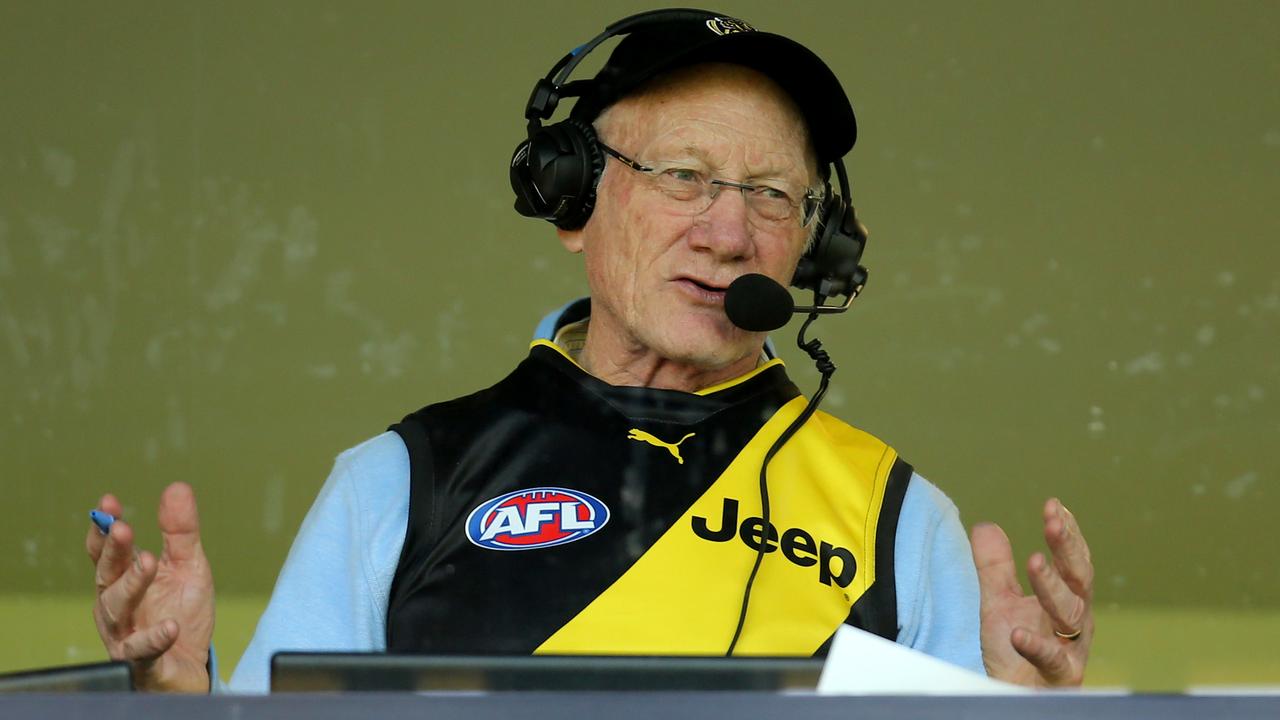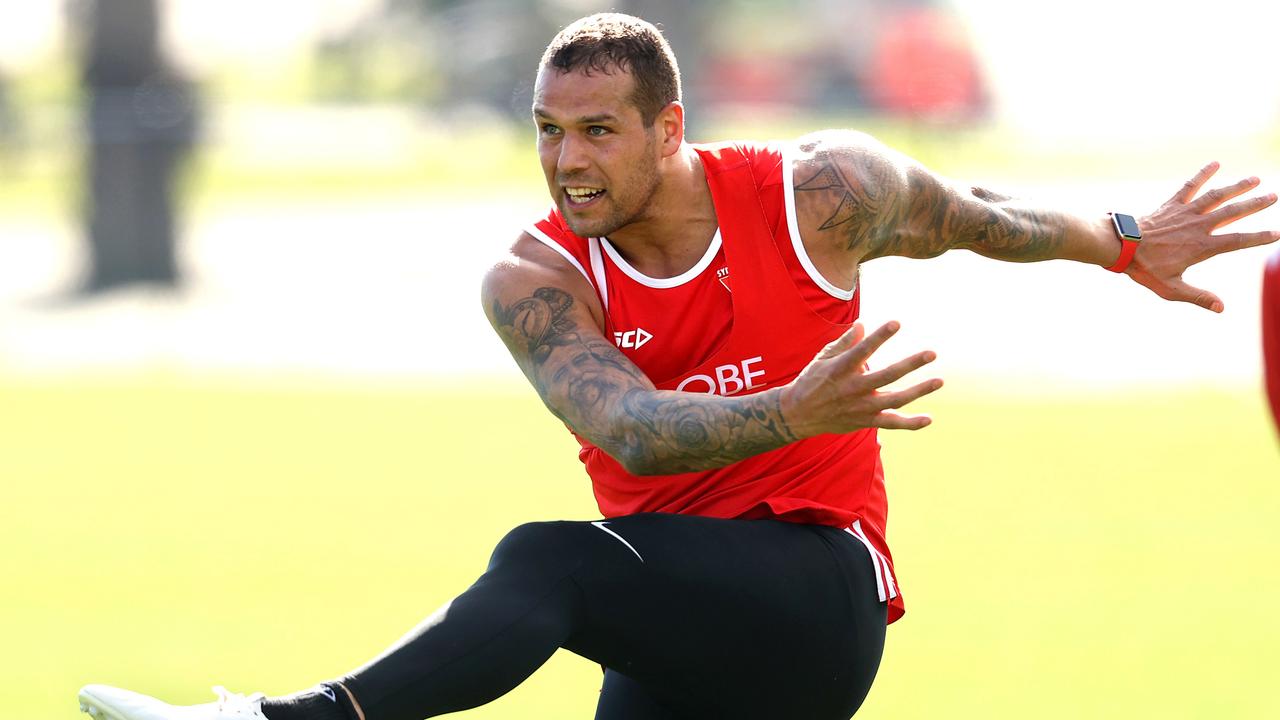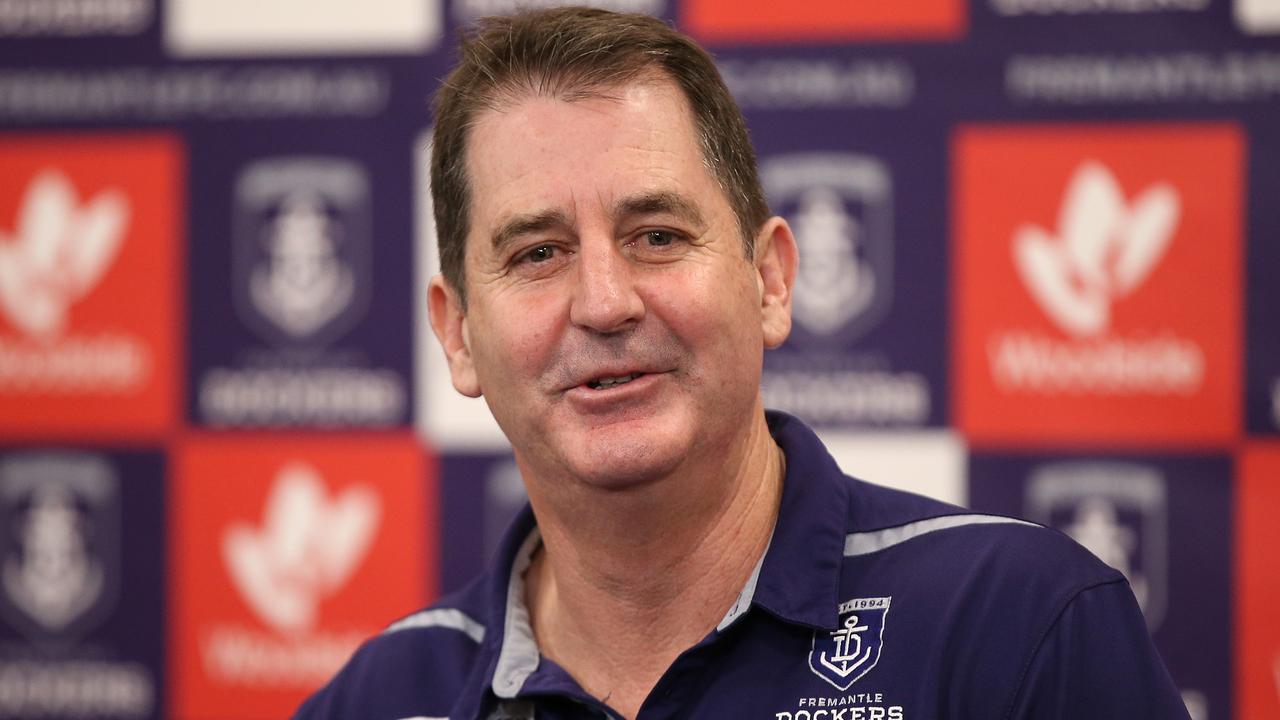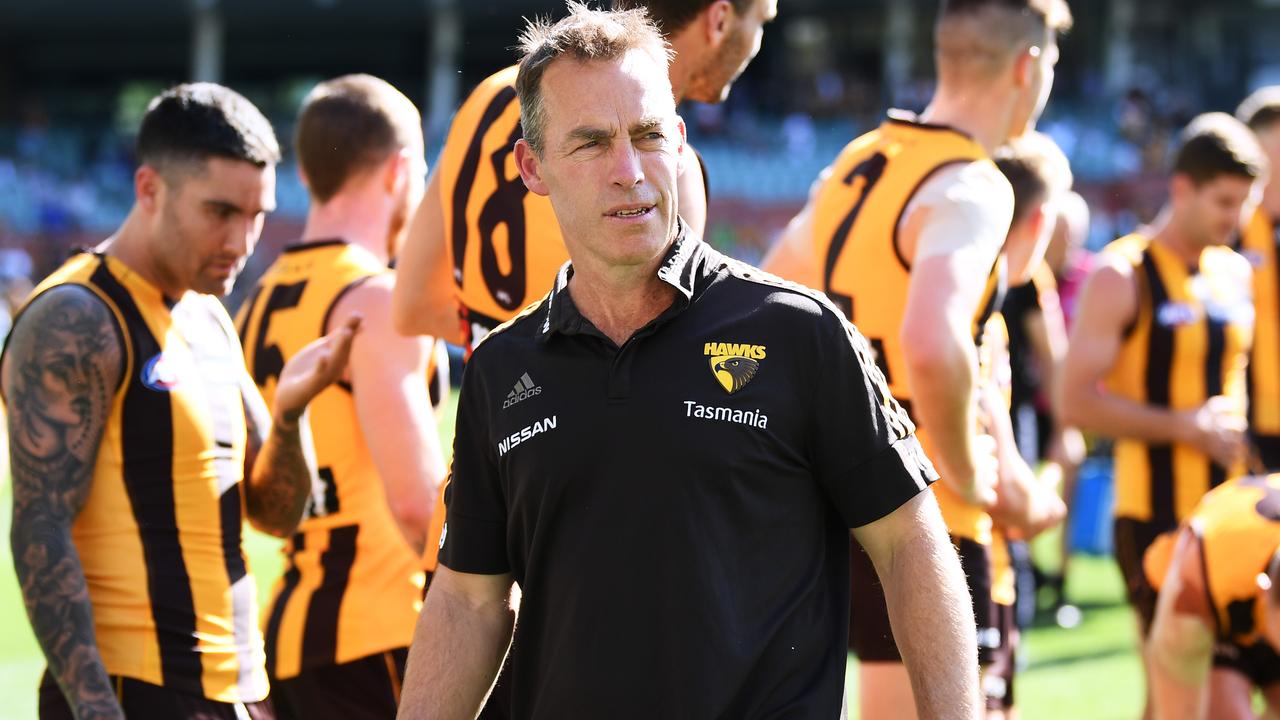Kevin Bartlett, Ross Lyon discuss scoring decline as AFL floats changes to stop defensive tactics
Scoring has dried up, ball movement has stagnated – but former coach Ross Lyon says this is the new normal for the AFL.

The AFL version of Australian Rules football is on the brink of crisis.
Alarming numbers highlight the decline in scoring and ball movement, both of which have been strangled by team defence, pressure, congestion and coaching mechanisms based somewhat on four dreaded words — defending with the ball.
The progressives say deal with it, it is modern-day football.
The traditionalists, led by Kevin Bartlett, are fearful for the game.
“Australian Rules football bores the sh*t out of everyone,’’ Bartlett said.
And KB doesn’t like swearing.
“The fabric of the game is being destroyed.’’
Kayo is your ticket to the best sport streaming Live & On-Demand. New to Kayo? Get your 14-day free trial & start streaming instantly >

The numbers support KB. The game over the past 15 years is being squeezed, shaped and roped into a defensive quagmire.
You can argue the game will sort of itself out, but plainly it hasn’t. Scoring has declined year on year and transition from defensive 50 to the forward 50 and to scoring has halved in 15 years.
You can argue that we should leave the rules alone, but rules aren’t hurting the game — the game itself is killing the game.
The AFL will look at rule adjustments for the 2021 season to “pull back the defensive layering which has enveloped the game’’.
So it should.
But the complexities of modern football are there for all to see.
Former coach Ross Lyon knows the problem.
“There’s no time and space,’’ he said.
His solution is to remove the wingmen — not because they are expendable, but because they are vital. They act like a defensive queen on a chess board.
They can run anywhere, but mainly reside around centre-back and kill countless attacking moves.
Solutions are offered by everyone. Starting positions at all stoppages based on three sets of pairs in the 50m arcs. Last touch out of bounds. Reduce interchange rotations. Tighten prior opportunity. The list goes on.
What do you, me, the kids, the networks and the AFL want footy to be?
Is it goals, high marks, running bounces or bubble football, rolling mauls, teams locked in defence and fit, strong, quick, smart grown men playing a hybrid game of keepings off?
Josh Daicos' finish against the Swans was simply incredible!
— AFL (@AFL) October 18, 2020
The talented Magpie has taken home the 2020 Goal of the Year 🙌#Brownlow pic.twitter.com/X7gceSWeiW
The numbers say scoring has dropped by an average of four goals in 15 years, mark/play on is down 15 per cent, successful switch kicks from defence are at their lowest and corridor use is eroding.
It’s why the AFL has to act this off summer.
Flair and flow has been sucked from the game and it’s why footy is approaching crisis.
So, what’s wrong with the game, what’s happening in the game and what can be done to fix it?
THE TRADITIONALIST
You’d have to be dead to not know Kevin Bartlett hates the interchange.
It’s slaughtered the game, the AFL great says.
It’s forsaken fatigue, which has helped create bubble football, which has swiped the game of highlights.
Asked how worried he was about footy, Bartlett laughed.
“I worry about the game because I feel we’re losing a lot of attributes,’’ he said.
How worried?
“I’m worried because football is becoming boring,’’ he said.
“I’ve got grandsons who follow the Tigers and they play footy and you sit down with them to watch the footy and they’re gone halfway through the second quarter because there’s not enough scoring, not enough highlights.
“It used to be a positional game, it’s no longer a positional game and because of that the game has suffered.
“We have density and congestion around the ball, we play keepings off, little handballs, little kicks, we go sideways, we defend with the ball in our hands instead of attacking with the ball in our hands.
“Bounces? They don’t exist any more … no one runs and carries any more and you know why . when you break away from the pack there’s no one there, you can’t run and bounce if there’s no one in front of you, so you kick it sideways.
“We bore the sh*t out of everyone.’’

Bartlett says the abnormal has become the normal with scoring. That the football fan is being brainwashed to accept, for example, Collingwood kicking one goal in the semi-final by Collingwood and Geelong kicking one goal in three quarters against Richmond in Round 17 are normal scoring habits.
He talks of champions such as Tony Lockett, John Coleman, Gordon Coventry, Peter Hudson, Gary Ablett, Jason Dunstall, Peter McKenna and Bob Pratt as if they are Greek Gods of Goalkicking.
“We’ve lost an iconic feature of the game,’’ he said.
“They brought in Bodyline to stop batsmen from scoring, in particular Don Bradman, but at least cricket said, ‘No, we’re not having that’.’’
If anything, the spectacle of modern football is in the intensity of pressure. But Bartlett is not impressed.
“Tell me anyone who goes to the footy and jumps up and says, that’s great intensity, tell me who writes in their footy record we just had eight tackles in that passage of play, tell me how many jump up and get excited about the 10 handballs in the space of about 10 metres … that doesn’t excite people,’’ Bartlett said.
“When you’re spending $14 million on your players and $9 million on coaches and footy staff, and we go to games where top sides kick four goals for the entire game, kick one goal for three quarters … it’s quite remarkable. We’re getting bigger, stronger, faster, we are more skilful, but I think the players are being held back from what they can truly do.

“We used to scoff at soccer for their scoring, what a stupid sport that was, my God when you consider we can go from one end of the ground to the other in 12 seconds, we can kick it, handball it, run with it, bounce it, and still we can’t score.
“The game is terrible.’’
So, how worried are you?’’
“It’s become sad and boring … some games were an embarrassment this year.’’
THE COACH
The way Ross Lyon talks about footy would be a foreign language to most watchers.
Today, when asked about the modern game and what can be done to fix it, he talks about roll arounds and spitters, off-ball players, about narrowing the ground, about the mechanics of team defence and the links within that defence and trying to break the perimeter.
He loves how Trent Cotchin plays defensive mid, loves the running wing beasts like Kamdyn McIntosh and loves how Richmond adjusted to Tom Stewart in the Grand Final.
You know what, he loves a lot of Richmond.
“Richmond could pressure you when it was 100 minutes, let alone when it was 80 minutes. It’s laughable,’’ he said.

At a guess, Lyon is three-quarters progressive and a quarter traditionalist. And likes to submerge himself in numbers and the mechanics. He is the AFL’s version of Dr Julius Sumner Miller — and knows why it is so.
“There’s no time and space in football,’’ Lyon said.
Told long kicks have increased — he already knew it — he said: “Because you get held up. It’s short kick, short kick out of defence and then they will go long to half-forward where, if you turn it over, you don’t get hurt as much.’’
Corridor use has declined.
Successful “switch’’ kicks to open up the fat side of the ground have declined. “They’re down to 40-odd per cent.’’
Correct again
Play-on numbers have deteriorated. “We used to say the quicker they went the more we liked it, but you’ve got to find a balance about where you play on,’’ he said.
Today’s football is about eliminating risk. In turn, it has bred ball control. Slow, short kicks. Keep the ball so the opposition can’t pressure or tackle and dispossess and then potentially score on turnover.
“As soon as you take a mark they can’t tackle you, so that’s why it’s short kick, short kick, uncontested mark. Control the game,’’ Lyon said.
At St Kilda, Lyon brought in his press after Alastair Clarkson brought in his cluster and then Mick Malthouse brought in his press and high rotation.
And the sport, between 2005 and 2010 was changed forever.

Control of the ball — or keepings off as KB says it — is king.
When the Hawks activated that plan during their golden run from 2011 to 2015 they were able to control the ball and still kick goals.
Geelong plays similar and for a period this season nailed it. But it is a rare combo.
The problem is a lot of teams play control and can’t score for a number of reasons. Their transition is stifled by effective defence and when they do get it inside 50m, they are further stifled by being outnumbered
It’s not a coincidence the best surge, pressure team is the premiership team.
“My personal preference is the way Richmond plays,’’ Lyon said.
“I like the chaos, the pressure, the hits, but I understand what control the ball is. Why do they do it? They want to draw them (the opposition) and then go to isolation.
“But it also lets you get organised behind the ball.’’
Lyon likes how the game is played, but if it requires more transition and less defence then “get rid of wingmen if you want to open up’’.
“Leigh Matthews said the same, I think Chris Scott and Clarko were talking about wingers and how important they are, how they link defence, we (coaches) know it inside out.’’
One example. The wingman rolls back. The fullback plays in front of the full-forward to cover the space in front and if the kick goes over his head, it’s often the winger or the “player on the off-ball side’’ who comes in and smashes the contest.
It happens time and again and cruels the key forward.
“They wedge them, one in front, one from behind. How often do you see a key forward who thinks he’s going to mark it and he gets smashed?’’
His point is, if you take the wingers out, who’s going to roll back? The half-forwards can’t do it because they are 80m away.
Moving the ball in today’s football, Lyon said, was “almost impossible’’.
“Think of shape of the ground,’’ he said.
“That’s why teams kick it deep into the pocket a lot because it narrows the ground, you can’t get out, you’ve got no room, you’ve got to be able to march the ball to the fat part of the ground.
“In saying that, if you get it in there, forward 50m stoppages, it’s almost impossible to get out and you score off a clearance almost 60 per cent of the time. They’re playing the numbers.’’
Lyon does not have the solution to rescue scoring and create less density.
He doesn’t like starting positions at all stoppages.
“What are you going to do, tell blokes to stop running. Put in Wing Defence and Wing Attack? The only solution is to change the defensive mechanism and how can you change the mechanism? All I know is get rid of one, take out the links.’’
MORE AFL:
TEN BURNING AFL TRADE QUESTIONS ANSWERED
TOP 10: WHAT REVISITED 2009 DRAFT WOULD LOOK LIKE
BEHIND THE SCENES OF THE AFL’S BIGGEST TRADE
THE PROMISE THAT SEALED CALDWELL’S DONS MOVE
Kick to mark length? “I don’t know what the ramifications would be. If you’re forced to kick longer, everyone would sit back.’’
Reduce interchange? “Everyone knows fatigue is part of it, but it’s how far you want to take it and how you want to get it.’’
Clearly, Bartlett and Lyon look at the game differently, but fundamentally have similar observations.
Lyon scratched the surface of the defensive mechanisms and Bartlett scratches his head at the impact of those mechanisms on the back of high interchange rotation.
“Anyway you cut it, there’s no time and space in the game,’’ Lyon said.
REVEALED: THE 2021 RULE CHANGE ON THE AFL’S AGENDA
– Mark Robinson
The AFL will consider if new rules are required for the 2021 season to help increase scoring and combat the defensive strategies enveloping the game.
The Competition Committee meets on Wednesday this week and rule discussions will be on the agenda.
The AFL has set its sights on “delays’’ in games which restrict players from moving the ball.
A reduction in interchange rotations might also be on the agenda.
Data has revealed teams averaged 75.7 points this season (when normalised to a standard length game), a drop of almost four goals from 2005 and a drop of two goals from 2015.
The spectacle of the game has diminished according to AFL legend Kevin Bartlett, who reiterated his call to drastically reduce interchange to save the game from the defensive quagmire.
Kayo is your ticket to the best sport streaming Live & On-Demand. New to Kayo? Get your 14-day free trial & start streaming instantly >

“The fabric of the game is being destroyed,’’ Bartlett said.
AFL football boss Steve Hocking said a better balance between defence and attack was required.
“We’ve got to strike a balance between defence and attack and if anything it’s probably tipped towards, not probably, it has tipped towards defence,’’ Hocking said.
“We are abundantly clear on that.
“The game is growing and what we need to do is make sure what levers are required, what adjustments are required to be made, and they need to be thought through.’’
The shorter season was expected to produce higher scoring, according to experts, but that did not eventuate.
“I’ve found 2020 to be a really insightful year because if you look at what we did, we provided a shorter game and did that for the reasons around the footy frenzy,’’ Hocking said.
“A lot of people talked to the fact there would be greater improvement off the back of that, there would be more attack, but what it did was it led to greater defensive systems enveloping the game even further.
“I’ve found 2020 to be productive and it’s not going to be wasted.
“What I’m seeing are all those little opportunities, avenues to attack, get thwarted.
“The first form of defence is delay.
“That is, in my view, what has increased in the game.
“They’re so professional, they know all the margins, they look to reduce all the margins for the ability to score and for good reason.
“That’s how they control teams in attack.’’
Unlike Bartlett, Hocking said he wasn’t concerned about the spectacle of the game.

“When you say to me am I concerned, well, no, because I’m immersed in the work that I’m doing and I’ve got a genuine commitment to support and grow the game,’’ he said.
“We haven’t really had a good run at the changes we made in 2018, we only had 2019 to have a significant look at that.
“If you have look at 2020, it’s been a more difficult to assess because it was such a unique year.’’
Hocking would not comment on potential rule changes to aid scoring.
“You’ve got to be really careful about what levers you pull.
“If you look back to work we’ve done, what we’re trying to do is pull back the defensive layering that’s come in over time.’’
MORE AFL NEWS
AFL 2020: GWS’ strong stance on Jeremy Cameron could change how clubs approach free agency
AFL 2020: Orazio Fantasia opens up about family and his move to Port
Collingwood fans revolt as fallout grows over club’s behaviour during AFL trade period
Collingwood Magpies fans now confused after Adam Treloar and Jaidyn Stephenson trades in AFL
He stressed that the finals series produced “pretty exciting football’’.
Bartlett said the recent new rules have not fixed footy’s problems and urged interchange to be drastically reduced to bring fatigue back to the game.
“The AFL is aware there is a problem with the game, they’ve shown us that by changing rules via 6-6-6, no third man in the ruck, bringing the ball back in from a behind, having a bigger protected zone, all that sort of stuff,’’ Bartlett said.
“None of that is going to solve the problem because fatigue governs the game.
“I’ve said for 10 years, we don’t want to fix the ingrown toenail, we want to fix the heart. that’s in ingrown toenail stuff. To save the game, you’ve got to attack the heart valve and that’s interchange.’’


